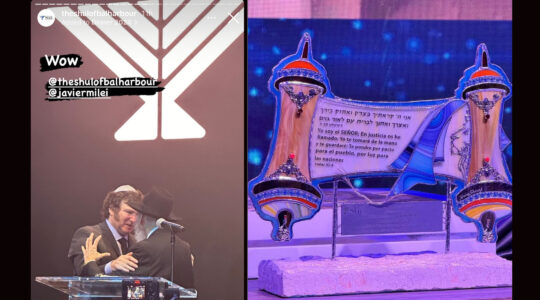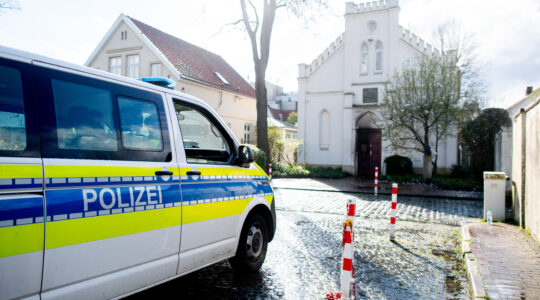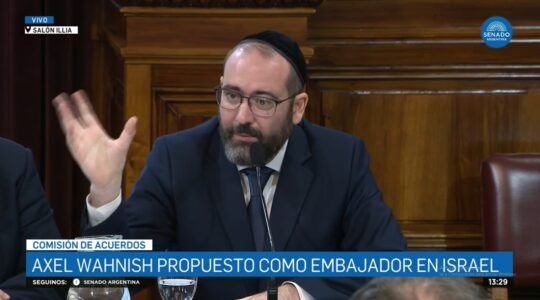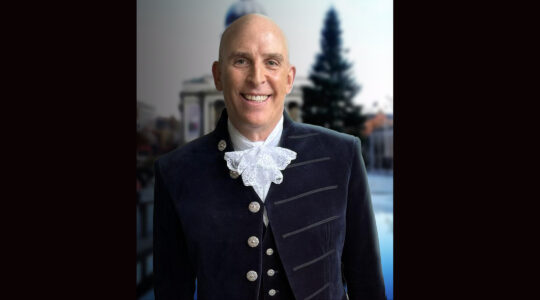PARIS (JTA)–Is the new occupant of Elysee Palace sending mixed signals when it comes to Israel?
On the one hand, French President Nicolas Sarkozy met with the families of the three Israeli soldiers abducted last year and promised to personally intervene to help set them free. One of those soldiers, Cpl. Gilad Shalit, holds French citizenship.
On the other hand, Paris played host this weekend to a parley involving Hezbollah, the Lebanese Shi’ite militia responsible for kidnapping two of the three missing Israeli soldiers, reservists Eldad Regev and Ehud Goldwasser. Hezbollah, which Israel and the United States consider a terrorist group, is one of 22 Lebanese political factions that were invited to a weekend conference in Paris hosted by the French Foreign Ministry aimed at sorting out Lebanon’s future and finding a way to defuse a potential civil war there along sectarian lines.
For now, French Jewish leaders and the families of the captive soldiers have been careful to express only praise for Sarkozy and French Foreign Minister Bernard Kouchner.
“With Sarkozy, things are very clear,” said Joel Mergui, president of the Consistoire, the principal organization that deals with the religious needs of French Jewry. “He has made a personal commitment to getting the soldiers released in his usual, very direct language. We are seeing that as a pro-Israel step.”
The mother of one of the captive soldiers, Miki Goldwasser, said the visit by Hezbollah represents an opportunity for France to get involved directly in the release of her son, Ehud, and the two other captive Israeli soldiers.
“President Sarkozy told us he is getting personally involved in the release of our boys,” Goldwasser said after meeting the French president. “We now believe that Bernard Kouchner and his Foreign Ministry team will pressure Hezbollah to release them.”
At the end of the weekend conference on Lebanon, Kouchner told reporters he was informed that the two Israeli solders seized by the Hezbollah last July are alive.
“Hezbollah representatives here at the conference told me they were working on an agreement through the United Nations that would include the release of the soldiers,” Kouchner said. “They also said that talks on a prisoner swap are in an advanced stage.”
The Israeli government did not confirm the report of U.N.-brokered discussions on a prisoner-exchange deal.
“Jewish community figures here are against the Hezbollah people coming to Paris,” Roger Pinto, a member of the CRIF umbrella organization of French Jewry, said last week. “But we also know the French Foreign Ministry must speak to them face to face to get the release message across. Foreign Minister Kouchner told us that himself.”
France does not consider Hezbollah a terrorist group; Israel and the United States do, and a group of U.S. congressmen recently petitioned Sarkozy to designate Hezbollah a terrorist group in France.
Noam Shalit, father of the 19-year-old Israeli corporal seized in June 2006 by Palestinian infiltrators from the Gaza Strip, said he and the other family members of the kidnapped soldiers believe the American call to brand Hezbollah a terrorist organization in France is not as important as speaking with Hezbollah.
“The Americans have classified the Hezbollah as terrorists for a long time,” he said, “but the French are being much more realistic about the situation, both in Lebanon itself and concerning our missing sons. The family members were not against the Hezbollah coming to Paris.”
“If I could go to Lebanon and speak with the Hezbollah, I would do it,” said Miki Goldwasser. “Putting them on a terrorist list means nothing. What I think of them personally does not matter. They are holding my son. That’s all.”
As president of the French Siona Association, Pinto helped organize the meeting several days ago between Sarkozy and the families of the abducted Israeli soldiers. Pinto said Sarkozy had told them he would not attend the Lebanese conference and would not personally talk to any Hezbollah officials who might attend.
In a series of high-level meetings organized by the Siona Association, family members of the captive soldiers, CRIF officials and members of the French Consistoire met recently with officials at Elysee Palace, the Foreign Ministry and the French Parliament.
“This is the third time I have come to France seeking help for the release of my son, Gilad, and I can tell you, a new wind is blowing in Paris,” said Noam Shalit. “The Sarkozy government is trying hard to obtain the release of Gilad, and also the two boys in Lebanon.”
French Jewish officials see the attention given to the issue of the captive soldiers, and Sarkozy’s strong language on the issue, as a sign of significant change in France’s attitude toward the Jewish state.
“This could be a major turning point in French foreign policy,” Pinto said. “Former President Chirac would not have used such strong language and repeatedly called the Hezbollah terrorists and, in fact, he refused to receive us when I brought the missing soldiers’ families to Paris last year. French policy has always been pro-Arab, and the rapprochement between Chirac and Ariel Sharon did little to change that.”
While Shalit hailed Sarkozy’s efforts, he had less praise for his own government, which he says has done little to bring his son home.
“We are returning to Israel with more hope, thanks to the French,” he said. “France is now the international center of activity for the release of our boys.”





